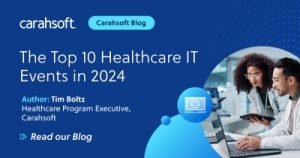
From artificial intelligence (AI) to predictive analytics, edge computing, and beyond, healthcare organizations have access to a wealth of technologies that can help improve patient care and clinical performance--and there are many more tools on the horizon. This year's healthcare IT conferences will be full of valuable insights about how these solutions can lead to better patient outcomes while helping organizations overcome some of the industry's biggest challenges, including cybersecurity threats, staffing shortages, budget constraints, and more.
Check out These Leading Healthcare IT Events:
- AI in Healthcare (Sept. 5-6; Boston, MA) - The AI in Healthcare Forum cuts through the hype and offers a comprehensive showcase of real-world examples illustrating the transformative potential of AI across the healthcare continuum. Don't miss this opportunity to immerse yourself in the latest advancements and forge connections with industry leaders driving the future of healthcare forward.
- Health IT Summit (Sept. 19; Rockville, MD) - Government is strategizing the next phase of health IT transformation to combat future health crises and advance health care, research and software implementation. In this process, agencies are employing new concepts and tools to further health agency missions across the public sector. Join GOVCIO as federal health IT leaders discuss the latest developments in public health through topics such as electronic health records (EHR) modernization, emerging tech investments, data interoperability and sharing, and more.
For further information on upcoming Healthcare IT events recommended by Carahsoft, please check out this blog.








